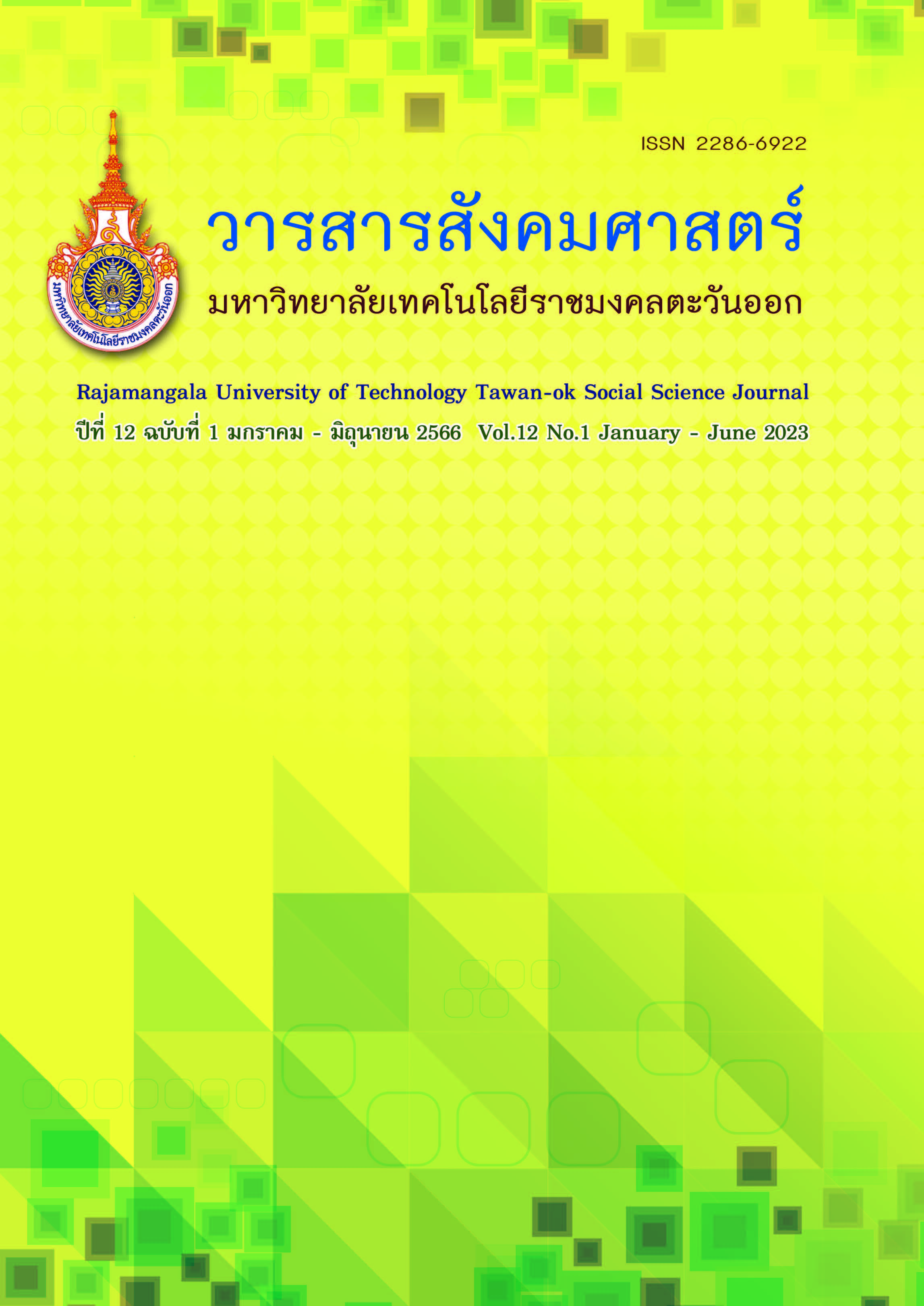Factors Influencing Entrepreneurial Intention of Students from Nakhon Si Thammarat Rajabhat University
Main Article Content
Abstract
This research aims to compare the level of student entrepreneurial intentions. Nakhon Si Thammarat Rajabhat University and to study the factors affecting student entrepreneurial intentions Nakhon Si Thammarat Rajabhat University. By using the theory of behavior that has been planned, including attitude, subjective Norms , perceived Behavioral Control ,University Support and Environment. The sample group was 400 students from Nakhon Si Thammarat Rajabhat University. The instrument used was an online questionnaire. The statistics used in the data analysis were frequency, percentage, mean, standard deviation. And used in the data analysis multiple regression statistical analysis.The results of the research revealed that the factors influencing the intention to become entrepreneurs of the students were attitude followed by perceived behavior control. and the support of the university and the environment respectively. Which could explain the covariance of the student's entrepreneurial intention was 65.50% with a statistical significance of 0.05, while the reference person amenability. There was no influence on the entrepreneurial intentions of the students.
Article Details

This work is licensed under a Creative Commons Attribution-NonCommercial-NoDerivatives 4.0 International License.
References
เกศินี จุฑาวิจิตร. 2552. ศักยภาพและความตั้งใจที่จะเป็นผู้ประกอบการของนักศึกษามหาวิทยาลัยราชภัฏนครปฐม ในภาวะวิกฤติเศรษฐกิจ 2551.นครปฐม: มหาวิทยาลัยราชภัฎนครปฐม.
ชาญชัย พรหมมี และ สิริมา นาคสาย.2563. ปัจจัยที่มีอิทธิพลต่อความตั้งใจเป็นผู้ประกอบการของนิสิตหลักสูตรที่มุ่งเน้นการเป็นผู้ประกอบการมหาวิทยาลัยพะเยา.Journal of Business Administration and Social Sciences Ramkhamhaeng University, 3(3), 65-80.
นันทพร เขียนดวงจันทร์ และขวัญกมล ดอนขวา. 2562. ทัศนคติ และความตั้งใจที่มีอิทธิพลต่อพฤติกรรมผู้บริโภคในการซื้อสินค้าผ่านไลน์.วารสารเทคโนโลยีสุรนารี, 13(2), 58-78.
นิรันดร ทัพไชย. 2565. ความตั้งใจในการเป็นผู้ประกอบการของนักศึกษามหาวิทยาลัยในประเทศในภูมิภาคเอเชียตะวันออกเฉียงใต้.วารสารสมาคมนักวิจัย, 27(1), 111-142.
พิชามญชุ์ อดุลวิทย์. 2554. ปัจจัยที่ส่งผลต่อการแบ่งปันความรู้ตามทฤษฎีพฤติกรรมตามแผน. วารสารนักบริหาร,31(1), 256-260.
พิมพิกา พูลสวัสดิ์ และวิษณุพงษ์โพธิพิรุฬห์.2562. อิทธิพลของปัจจัยตามทฤษฎีพฤติกรรรมแผนที่มีต่อความตั้งใจที่จะเป็นผู้ประกอบการของนักศึกษาปริญญาตรี มหาวิทยาลัยราชภัฏภูเก็ต. วารสารบริหารธุรกิจศรีนครินทรวิโรฒ,10(2), 50-61.
มหาวิทยาลัยราชภัฏนครศรีธรรมราช. 2565. รายงานสถิติจำนวนนิสิตปัจจุบัน.สืบค้นเมื่อ 1 กันยายน 2565.
สำนักงานปลัดกระทรวงการอุดมศึกษาวิทยาศาสตร์วิจัย และ นวัตกรรม. 2564 “การส่งเสริมการเป็นผู้ประกอบการ”สืบค้นเมื่อ 2 กันยายน 2565.
Ajzen, I. (1991). The Theory of Planned Behavior. Organizational Behavior and Human Decision Processes, 50, 179-211.
Autio, E., Keeley, R. H., Klofsten, M., & Ulfstedt, T. (1997). Entrepreneurial intent among students: testing an intent model in Asia, Scandinavia and USA ,133-147
Bandura, A., Adams, N. E., Hardy, A. B., & Howells, G. N. (1980). Tests of the generality of self-efficacy theory. Cognitive therapy and research, 4(1), 39-66.
Basu, A., & Virick, M. (2008). Assessing entrepreneurial intentions amongst students: A comparative study. In VentureWell. Proceedings of Open, the Annual Conference (p. 79). National Collegiate Inventors & Innovators Alliance.
Driessen, M. P., & Zwart, P. S. (2007). The entrepreneur scan measuring characteristics and traits of entrepreneurs. Available from Internet:< http://www. necarbo. eu/files/E-scan% 20MAB% 20Article. pdf.
Ferreira, J. J., Raposo, M. L., Rodrigues, R. G., Dinis, A., & Do Paco, A. (2012). A model of entrepreneurial intention: An application of the psychological and behavioral approaches. Journal of small business and enterprise development.
Johannisson, B. (1991). University training for entrepreneurship: Swedish approaches. Entrepreneurship & Regional Development, 3(1), 67-82.
Kautonen, T., Van Gelderen, M., & Tornikoski, E. T. (2013). Predicting entrepreneurial behaviour: a test of the theory of planned behaviour. Applied economics, 45(6), 697-707.
Kraaijenbrink, J., Spender, J. C., & Groen, A. J. (2010). The resource-based view: A review and assessment of its critiques. Journal of management, 36(1), 349-372.
Kidwell, B., & Jewell, R. D. (2010). The motivational impact of perceived control on behavioral intentions. Journal of Applied Social Psychology, 40(9), 2407-2433.
Krithika, J., & Venkatachalam, B. (2014). A study on impact of subjective norms on entrepreneurial intention among the business students in Bangalore. IOSR Journal of Business and Management, 16(5), 48-50.
Krueger, N., Reilly, M., Carsrud, A. (2000).Competing Models of Entrepreneurial Intention.Journalof Business Venturing.15, 411-432
Lee, S. H., & Wong, P. K. (2004). An Exploratory Study of Technopreneurial Intentions: A Career Anchor Perspective. Journal of Business Venturing, 19, 7-28.
Lumpkin, G. T., & Dess, G. G. (1996). Clarifying the entrepreneurial orientation construct and linking it to performance. Academy of management Review, 21(1), 135-172.
Ma, Xifang, Zhengyun Rui, and Genyuan Zhong. (2022). "How large entrepreneurial-oriented companies breed innovation: the roles of interdepartmental collaboration and organizational culture.Chinese Management Studies..
Prodan, I., & Drnovsek, M. (2010). Conceptualizing academic-entrepreneurial intentions: An empirical test. Technovation, 30(5-6), 332-347.
Remeikiene, R., Dumciuviene, D., Startiene,G.(2013).Explaining Entrepreneurial Intention ofUniversity Students:The Role of Entrepreneurial Education, Active Citizenship byKnowledge Management & Innovation:Proceedings of the Management, Knowledgeand Learning International Conference 2013, ToKnowPress.
Rudhumbu, N., Svotwa, D., Munyanyiwa, T., & Mutsau, M. (2016). Attitudes of students towards entrepreneurship education at two selected higher education institutions in Botswana: A critical analysis and reflection. Academic Journal of Interdisciplinary Studies, 5(2), 83-83.
Sánchez, A.C. (2014). The Role of Personal Values in the Entrepreneurial Process. Ph.D.Thesis,Barcelona University.
Saraih, U. N., Aris, A. Z. Z., Mutalib, S. A., Ahmad, T. S. T., Abdullah, S., & Amlus, M. H. (2018). The influence of self-efficacy on entrepreneurial intention among engineering students. In MATEC Web of Conferences (Vol. 150, p. 05051). EDP Sciences.
Schlaegel, C., & Koenig, M. (2014). Determinants of entrepreneurial intent: A meta–analytic test and integration of competing models. Entrepreneurship theory and practice, 38(2), 291-332.
Sieger, P., & Monsen, E. (2015). Founder, academic, or employee? A nuanced study of career choice intentions. Journal of Small Business Management, 53, 30-57.
Souitaris, V., Zerbinati, S., & Al-Laham, A. (2007). Do entrepreneurship programmes raise entrepreneurial intention of science and engineering students? The effect of learning, inspiration and resources. Journal of Business venturing, 22(4), 566-591.
Van Gelderen, M., Brand, M., van Praag, M., Bodewes, W., Poutsma, E., & van Gils, A. (2008). Explaining entrepreneurial intentions by means of the theory of planned behaviour. Career Development International, 13(6), 538–559.


